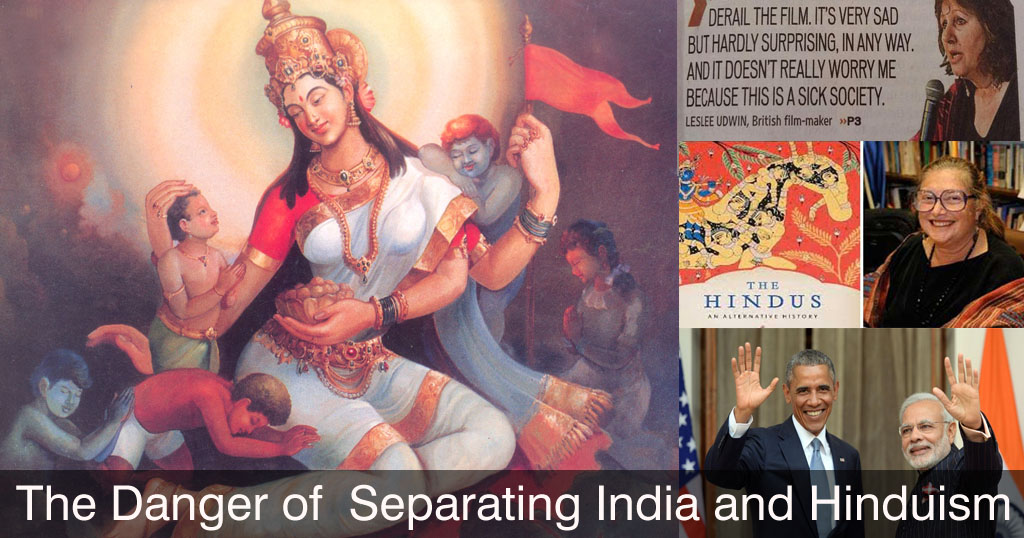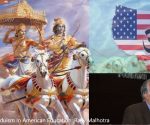On Separating Hinduism and India
Why is it dangerous to separate India and Hinduism? Because that is exactly the divide and conquer policy of the British that got us to this state in the first place. Playing people against each other. The latest in the attack is from Murali Balaji of the Hindu American Foundation who, in his article in the Huffington post a couple of days back, is pitching this idea of Hinduism as different from India and wants to have an advocacy that focuses only on Hinduism and to have Hindus in American develop their own identity. As always, it is the attacks from inside that affect Hinduism more than the attacks from the enemies we know.
While on the surface this stand point – the idea that we have less crap to defend and focus on what matters to Hindus world wide- appears to be appealing and comfortable maybe even logical, it is a very shortsighted approach. Because, fundamentally Hinduism, the religion, has deep deep deep roots in India. Much deeper than what the people trying to understand it realize. The land, its people, its DNA, its history, its stories, its energy, its food, its temples.. those are all what Hinduism is. And it is a living religion. Not a dead and gone one. Hinduism is not just the books and philosophies. If India perishes, Hinduism has failed and will perish too. Hinduism cannot be migrated to Mars as we believe it can. It needs Bharath to exist. If it is transported, it will be a new religion and can only be done by an incarnation that happens again – as they do from Yuga to Yuga.
That being said, we have to clearly separate what is Hindu/India from what is a cultural pollution by the Muslim, Christian and Atheistic invaders over the last thousand years. Doing that is right. But that is the only separation that is allowed. When supporting or criticizing the current government or any Hindutva group, one should look at it at the context that this is the first Hindu rule in India in the last 700 years ! Many of the policy decisions would be explainable when you look at it from the angle of the atrocities that India and Hinduism has suffered over the past 1000 years and the amount of wrongs that have to be corrected and the curse of secularism – which is discrimination against Hinduism worded in a politically correct sounding term.
Many accusations of caste intolerance or women’s rights (or lack thereof) or any such matter are actually veiled attacks against Hindu beliefs and traditions and blowing out of proportion any defects in the Hindu system – most of them caused by external influences. Not understanding this many Hindus “groups” want to stay away from this battle. But in reality, defense of India is defense of Hinduism and vice versa. Because the attackers are not targeting just India.. but targeting Hinduism through attacking India. My advice to these groups is that they learn to understand and defend against these attacks. Not retreat in powerlessness because the attack on India is too powerful.
And when I say Hindu, I include Buddhists, Jains, Sikhs and all sub sects that were born out of the Hindu Vedic civilization. The fact that they separate themselves does not mean we need to separate ourselves from them. Calling them out as separate religions indicates a certain ignorance about what exactly Hinduism is. Hinduism apart from being a set of practices is really the soil of self inquiry and the energy of the land that gives rise to hundreds if not thousands of paths for people to follow towards liberation and towards understanding the mystical underpinnings of the cosmos that we live in. And while the children may move away from the parents, the parents – in India at least – never disown their children.
Also, I wonder, if many Hindus from other countries feel having allegiance to India – or as they say, having to defend India – is somehow in conflict with their nationalities. This again is a myopic view. For anyone who calls herself a Hindu and understands it more than just a badge they put on themselves to say that they are not Muslim and not Christian, India will always be the mother land – the source. A person can marry – how many ever times they want – but the relationship with the mother is unique and eternal. When you look at it from this angle, there is no conflict between the two identities. Hinduism is all about co-existing of apparently contradicting dualities. Western-ism is all about classification, isolation and “either you are with us or against us” thinking. So to defend India without conflict with your current nationality all you have to do is understand and live Hinduism deeper.
This may sound extreme to anyone who has been duped by the sedative of secularism. But I stand by the statement that anyone who is Anti-Hindu is Anti-Indian. Anyone who is Anti-Indian is Anti-Hindu. There is no other way about it.
Again, that is not to say you don’t have the right to criticize the acts of Modi or anyone else who too identifies themselves as Hindu. Hinduism encourages and infact thrives on criticism, debate and discussion. But we criticize as an insider. Not an outsider. Separating because it is convenient or because you don’t want to understand the depth of India is short sighted. Understanding the greatness of India and separating out that which it is not is essential to .. or rather IS .. understanding Hinduism.
http://www.huffingtonpost.com/murali-balaji/hindu-and-indian-advocacy_b_7714790.html
Three years ago, I was invited to lecture at Tel Aviv University in Israel on my research about how nationalism and masculinity are represented in Indian and Israeli media texts.
Shortly after my lecture, a middle-aged professor told me that he was disappointed in President Obama and the Americans. I initially assumed that he was let down because of Obama’s dislike of Israeli Prime Minister Benjamin Netanyahu, a right-wing nationalist who accelerated Jewish settlement building in the Occupied Territories. What the professor said next nearly floored me:
“Obama needs to do more to pressure [Netanyahu],” he said. “The Americans can’t let blindly support Israel, especially when it’s clearly in the wrong.”
I’ve been reminded of this conversation more and more as of late, as many Hindu Americans — particularly those who also identify as Indian Americans — are put in the position of having to speak about (or for) India. The presumption, of course, by many non-Indians and non-Hindus, is that Indians are Hindus, and their identities are inextricably tied to a sense of Indianness. Many scholars, even those of Indian descent, have made similar — but inaccurate — claims. To be sure, there are many Hindu Americans who identify with India (whose heterogeneity is vastly understated in the West), but there are also those that don’t.
Why is this important to emphasize? Simply put, many Hindus — regardless of their background — are put in positions of trying to explain India, even if they have minimal connection to or interest in the country. They are also wrongly assumed to be the spokespeople for India, particularly its social and economic issues. What makes this problematic is that it essentializes both the Indian and Hindu experience, minimizing their diversity and global diaspora.
To be sure, some of India’s most passionate and fervent advocates within the country and abroad are Muslim, Sikh, Christian, Jain or atheists, while more than a handful of the country’s most vocal critics (particularly on issues such as gender and LGBT rights, environmental protection, and militarization along the border with Pakistan) are Hindu. Likewise, some of Hinduism’s most passionate defenders in the West are not Indian – or of any South Asian descent. This underscores the problem we face when conflating national, religious, and political identities.
This is a problem that Indian-Americans must contend with. Criticizing India, a political party or leader (such as Indian prime minister Narendra Modi) does not make one a self-loathing Hindu, just as being opposed to Israeli occupation of the Palestinian territories does not make one a self-loathing Jew. Indeed, our faith is often strengthened by our ability to speak out on issues which we are passionate about.
Hindu Americans who advocate for accuracy about the religion can acknowledge India’s importance in Hindu philosophy and cultural traditions, but it’s important to understand that they shouldn’t feel compelled to become India experts — or become India’s flag-wavers in America. There are many Hindus — including me, as a second generation Tamil whose family left India in the late 1960s — who don’t have a strong connection to India or its political, social, and economic conditions (or are deeply critical of its militarized and hypermasculine nationalism). However, when media outlets like the New York Times (which frequently blames India’s social ills on Hindus and Hinduism) misrepresent the religion within the context of Indian society, some of us momentarily cast aside our ambivalence to hold them accountable.
With that said, I think it’s important for us to understand and differentiate between what it means to be an Indian and what it means to be Hindu. We need to appreciate the fact that those who belong to Indian religious minority communities should feel comfortable in identifying as Indian-Americans, and that space must be carved out for them to express their identities (and even their grievances). Similarly, we should be more than willing to make ample room for the Hindu voices who either have little to no connection to India or are critical of the country’s political, social, and economic issues. For Indian-American Hindus who are struggling to articulate their religious identities while remaining critical of Indian policies, organizations such as J Street (a pro-peace Jewish organization that has been one of the top opponents of the settlements) might be a good model to emulate.
Overlap might be inevitable in some cases, but as Anantanand Rambachan and I have written, we need to make the stronger argument for defining what it means to be Hindu in a way that transcends national, cultural, linguistic, and social considerations. I think removing the burden of having to defend India can – in the words of my friend and HAF colleague Suhag Shukla — hasten the transition of Hindu Americans from self-conscious to self-confident.
Until then, that Israeli professor’s comments from several years ago will continue to replay in my head as what can go wrong when we conflate politics with religious loyalty.










